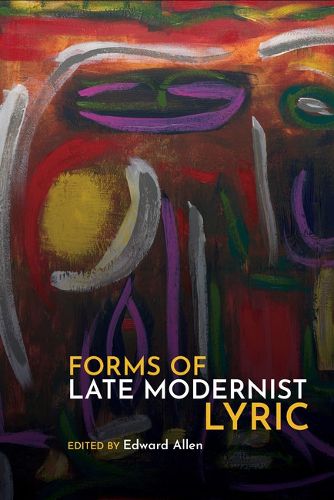Readings Newsletter
Become a Readings Member to make your shopping experience even easier.
Sign in or sign up for free!
You’re not far away from qualifying for FREE standard shipping within Australia
You’ve qualified for FREE standard shipping within Australia
The cart is loading…






What do we mean when call something a lyric poem? How many kinds of lyric are there? Are there fewer now than there were in 1920 or 1820 or 1620? The purpose of Forms of Late Modernist Lyric is to show that our oldest styles of poetic articulation - the elegy, the ode, the hymn - have figured all too briefly in modern genealogies of lyric, and that they have proved especially seductive, curiously enough, to avant-garde practitioners in the Anglophone tradition. The poets in question - Jorie Graham, Frank O'Hara, Michael Haslam, J. H. Prynne, Claudia Rankine, and others - have thickened the texture of lyric practice at a time when the growing tendency in critical circles has been to dissolve points of difference within the genre itself. The broader aim of this volume is to demonstrate that experimental poets since 1945 have not always been rebarbative and anti-traditional, but rather that their recourse to familiar forms and shapes of thought should prompt us to reconsider late modernism as a crucial phase in the evolving history of lyric.
CONTRIBUTORS: Ruth Abbott, Edward Allen, Gareth Farmer, Fiona Green, Drew Milne, Jeremy Noel-Tod, Sophie Read, Matthew Sperling, Esther Osorio Whewell, John Wilkinson
$9.00 standard shipping within Australia
FREE standard shipping within Australia for orders over $100.00
Express & International shipping calculated at checkout
What do we mean when call something a lyric poem? How many kinds of lyric are there? Are there fewer now than there were in 1920 or 1820 or 1620? The purpose of Forms of Late Modernist Lyric is to show that our oldest styles of poetic articulation - the elegy, the ode, the hymn - have figured all too briefly in modern genealogies of lyric, and that they have proved especially seductive, curiously enough, to avant-garde practitioners in the Anglophone tradition. The poets in question - Jorie Graham, Frank O'Hara, Michael Haslam, J. H. Prynne, Claudia Rankine, and others - have thickened the texture of lyric practice at a time when the growing tendency in critical circles has been to dissolve points of difference within the genre itself. The broader aim of this volume is to demonstrate that experimental poets since 1945 have not always been rebarbative and anti-traditional, but rather that their recourse to familiar forms and shapes of thought should prompt us to reconsider late modernism as a crucial phase in the evolving history of lyric.
CONTRIBUTORS: Ruth Abbott, Edward Allen, Gareth Farmer, Fiona Green, Drew Milne, Jeremy Noel-Tod, Sophie Read, Matthew Sperling, Esther Osorio Whewell, John Wilkinson